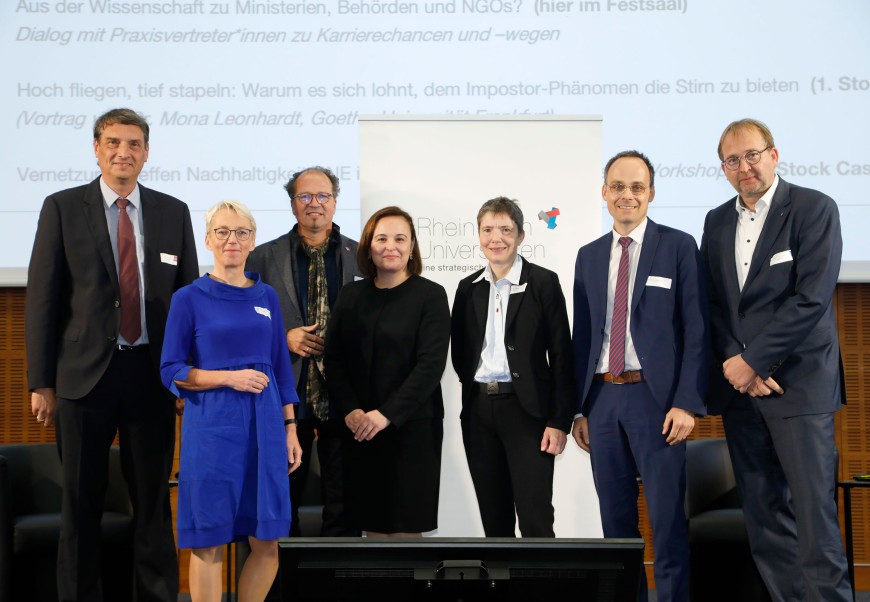A space full of opportunities: The “Rhine-Main Universities” (RMU) Strategic Alliance
Day of the RMU (f.r.t.l.): Prof. Dr. Enrico Schleiff (GU), Prof. Dr. Denis Alt (MWG), Prof. Dr. Marlis Hochbruck (KIT), Ayse Asar (HMWK), Prof. Dr. Stephan Jolie (JGU), Prof. Dr. Tanja Brühl (TU Darmstadt), Prof. Dr. Stefan Müller-Stach. Photo:Uwe Dettmar
Held on October 24, 2022, the fourth “Day of the Rhine-Main Universities” focused on scientists in their early career phases as well as the academic mid-level faculty. Opening up more opportunities for them is one of the core concerns of the Strategic Alliance of Rhine-Main Universities (RMU).
Following two years of pandemic, the annual “Day of the Rhine-Main Universities” was this year once again held in presence. In the preceding two years, the meetings were hosted digitally: first in 2020 by the Technical University of Darmstadt, and last year by the Johannes Gutenberg University Mainz. In other respects, too, the event, which drew several hundred participants from Hesse and Rhineland-Palatinate, went back to its pre-pandemic roots: As in 2019, Goethe University Frankfurt hosted the annual meeting on its Westend Campus, welcoming employees as well as RMU members and friends.
In previous years, the focus lay on the potential of the cross-federal state alliance (2019), teaching and learning (2020) as well as research (2021). This year, the RMU Day centered on scientists in their early career phases and the “academic mid-level staff”. “Winning over these talents for the long term and upskilling hem significantly enriches every university, strengthening and sharpening its profile as well as its future viability,” Goethe University President Prof. Dr. Enrico Schleiff emphasized in his welcoming speech.
In two concise “Impulses from Politics”, Ayse Asar, State Secretary in the Hessian Ministry of Science and the Arts, and Dr. Denis Alt, State Secretary in the Ministry of Science and Health of the federal state of Rhineland-Palatinate, underlined the importance of promoting and supporting young scientists. “The future of science lies in networking and in alliances that optimally combine the strengths of individual scientific institutions. This is exactly where the three RMU universities are leading the way,” said Ayse Asar, State Secretary in the Hessian Ministry of Science and the Arts, adding that, “They unite almost 10,000 scientific employees, especially doctoral students and postdocs, who are the main focus at this year’s RMU Day. Without this academic mid-level staff, the universities would not be the same. That is why smart personnel development, as well as comprehensive support, qualification and advisory structures are so highly relevant. At the federal government level, we are supporting the universities both financially and structurally, including, for example, with opportunities for new career paths – such as the qualification professorship, the tenure track, or the tandem professorship – offered under the Hessian Higher Education Act, which was amended in 2021. The ‘Code for Good Work’ was drawn up the same year. In it, the universities commit themselves to new standards for better and more attractive working conditions.”
Dr. Denis Alt, State Secretary in the Ministry of Science and Health of the State of Rhineland-Palatinate, emphasized: “The Rhine-Main Universities Strategic Alliance, with the partner universities in Frankfurt, Darmstadt and Mainz, is an important building block for raising the region’s national and international profile in a differentiated scientific landscape. Together, these three strong research universities can further advance the Rhine-Main region as a science engine, benefiting not only the universities, but also the federal states of Hesse and Rhineland-Palatinate. The scientific successes of recent years – in the joint acquisition of third-party funding, for instance – prove that the universities are on the right track. We want to do everything in our power to support them.”
In her keynote address, Prof. Dr. Marlis Hochbruck of the Karlsruhe Institute of Technology (KIT), and former vice president of the German Research Foundation (Deutsche Forschungsgemeinschaft, DFG), also put the promotion of early-career scientists at the “center of science(s)”.
At the same time, however, it also became clear that the early career years of scientists are by no means characterized only by hope and a sense of optimism: At this stage of their lives, many scientists feel particularly burdened by economic uncertainty, the question of whether an existing or future family can be reconciled with a career, obstacles to the realization of ambitious research interests and a generally uncertain future. This was also the topic of a panel discussion between four representatives of university management, scientists in their early career phases and the RMU support structures for so-called “early career researchers”.
This “public” part of the RMU Day was followed by a varied program of workshops and project presentations of RMU cooperations. The workshops dealt with specific funding opportunities within the RMU at both the national and the European level, alternative career paths to ministries, other authorities and NGOs, and ways of freeing oneself of the “Impostor Syndrome”, i.e. massive self-doubt regarding one’s own abilities, achievements and successes. In a networking meeting on the topic of sustainability, members of the departments overseeing sustainability at the three universities exchanged views on “Education for Sustainable Development”.
At the end of the event, Prof. Dr. Tanja Brühl, President of the Technical University of Darmstadt, Goethe University President Prof. Dr. Enrico Schleiff, and Prof. Dr. Stefan Müller-Stach, Vice President of Research and Academic Growth at the Johannes Gutenberg University of Mainz, drew a positive yet differentiated balance: “Although universities are unable to take away some of the burdens faced by scientists at the early stages of their career, they can take many measures to make this phase easier: through targeted advice tailored to individual needs, a wide range of high-quality training opportunities, networking options and tangible support. These are all the more effective when universities do not act on their own, but as part of an alliance, using the resources available to them.”
This is precisely what the RMU sets out to do: It wants to be a true “space full of opportunities”. To that end, President Schleiff announced the establishment of a (virtual) exchange platform for RMU postdocs, which will also provide information to external parties and present the existing funding measures in a manner befitting the target group. “As RMU, we want to attract young scientists in Germany and worldwide – because we need their creativity, their esprit, their curiosity and their courage.”
Vice President Müller-Stach presented the plans for the further development of the professional skills program offered by the RMU funding institutions: GRADE (Frankfurt), Ingenium (Darmstadt) and Gutenberg School (Mainz). “We will continue to expand the joint program for scientists in their early career phases. By bundling our strengths at RMU, scientists will be able to make more flexible use of the offerings.”
President Brühl presented a new joint funding line of the RMU Initiative Fund Research, designed exclusively for RMU scientists in their early career phase: By networking within the RMU, they are now eligible for up to 30,000 in financial support. “We want to promote the creative and courageous project ideas of our early career researchers and encourage them to network and cooperate more closely within the Rhine-Main Universities Strategic Alliance – whether through joint publications, project proposals or in the field of science communication,” Brühl explained. Finally, in keeping with tradition, she invited all guests to the next RMU Day, to be held in Darmstadt in 2023. “I am very much looking forward to welcoming you all next year at TU Darmstadt to discuss another facet of our alliance’s further development.” At the end of the day, all three university representatives agreed: For scientists in the early career phase, RMU is becoming the ideal starting point for building independent careers.




